VegasTech got a behind-the-scenes tour of the UNLV Team Vegas 2017 Solar Decathlon entry, a net 0 house with ambitious plans and a worthwhile mission.
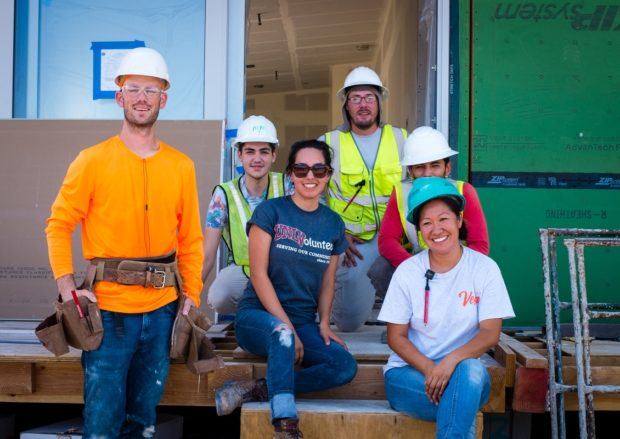
Some of the UNLV students, leadership, and volunteers making it all happen.
About the Solar Decathlon
The US Department of Energy’s Solar Decathlon challenges teams of college and university students from around the world to design and build full-sized, solar powered houses.
Solar power is just the beginning, though. To win, a team must design a house that performs well in 10 categories:
- Architecture
- Market potential
- Engineering
- Communications
- Innovation
- Water
- Health and comfort
- Appliances
- Home life
- Energy
Teams design and build full sized houses, targeted to a specific market (Team Vegas is building their home for the Las Vegas market) and in the process, they are challenged to create homes that address specific health or market needs.
Before construction can start, though, teams submit their plans and proposals for consideration. Once selected as a competitor, that team raises funds, builds their house, and then transports it to the competition. This year, that means that the houses must find their way to Denver.
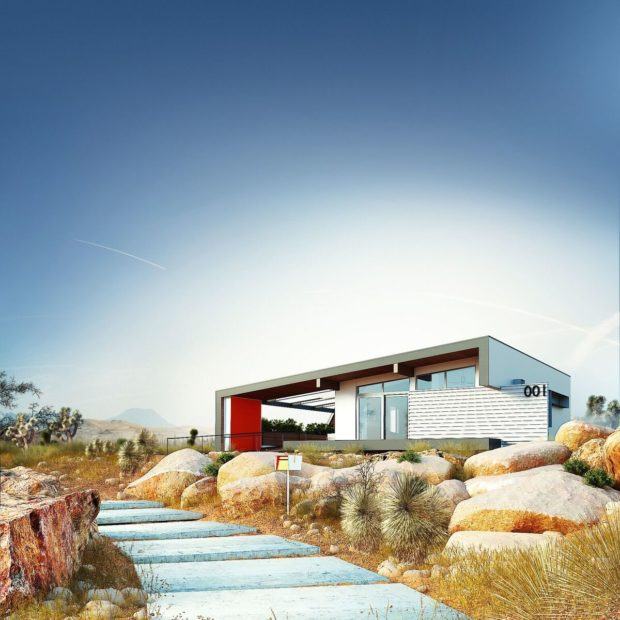
UNLV’s 2017 Solar Decathlon Design
This competition isn’t just conceptual.
The Solar Decathlon aims to inspire innovative, practical, and marketable designs that can actually be built and occupied. For that reason, all designs for completed houses are open source, and anyone can view and download the construction drawings and manuals for free.
Once the houses arrive in Denver, teams must prove that their designs are livable and practical.
To prove that a design is functional and marketable, teams must complete basic tasks such as doing laundry, hosting dinner parties, and driving electric cars charged by the home’s systems.
In years past, teams who were accepted to compete were given stipends over the course of their build, but this year, the rules have changed. All teams who participate and show up with a house at the competition in Denver will be awarded at least $100,000, and the top prize is $300,000 to the winning team.
The last time Las Vegas participated was in 2013, and they came in at a close second place. This year, we’re all hoping for UNLV to take the top spot.
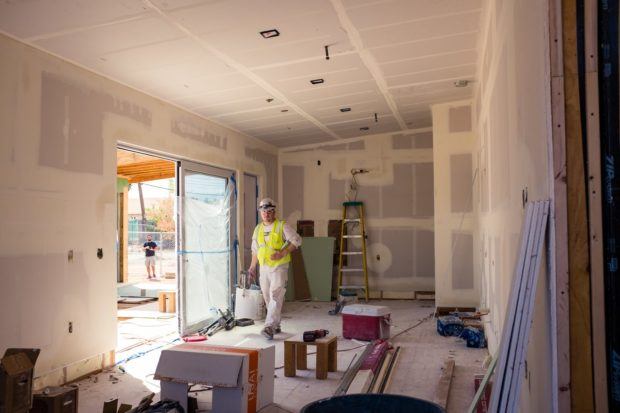
They’re working hard to make it to Denver on time.
UNLV Team Vegas’ 2017 Solar Decathlon House
For their 2017 Solar Decathlon entry, Team Las Vegas is focused on the challenges of an aging population.
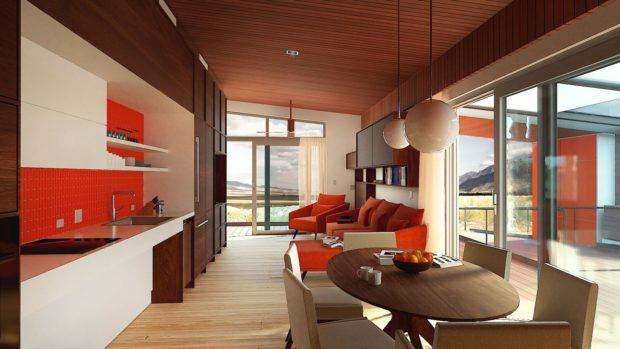
It doesn’t look like this yet.
Sinatra, the house designed by Team Vegas, is currently under construction, and VegasTech got a behind the scenes (and a behind the walls) tour of the progress. Classes started this week and Team Vegas is operating under a looming deadline, so work continued around us as we talked to Interior Architect Brenda Tena and Construction Manager Kalewalani Bancaco.
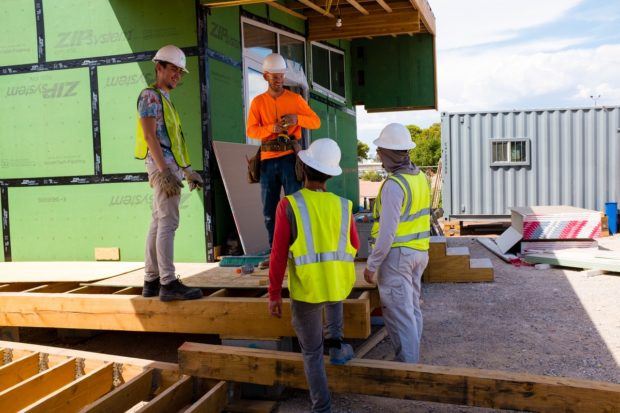
This is neither Brenda nor Kalewalani, but they are included in the first picture in this post.
Technically a mobile home, this modular design is being built in 3 pieces so that it can make the trip from the UNLV campus to Denver, Colorado in time to participate in the 2017 Solar Decathlon.
Here’s something we bet you’ve never thought about:
Because of things like bridges, traffic lights, and other overhangs, Team Vegas can’t take a direct route from Las Vegas to Denver. The route has to be planned so that they don’t risk encountering any headspace obstacles.
Aside from being mobile, Sinatra has plenty of clever and innovative design features that are specifically tailored for accessibility and safety as occupants age in place. This design allows aging residents to live actively, comfortably, and efficiently while caregivers have simple and effective monitoring tools to easily assist when needed.
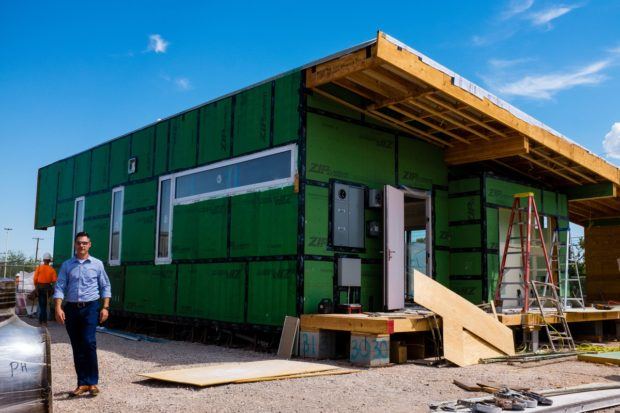
Right now, it’s literally a green house.
The home’s layout is wheelchair accessible, featuring large doorways and pocket doors, accessible appliances, and redundant power systems to continue providing energy to medical devices in the event of power grid failure or damage.
After consulting with experts in the community such as nursing homes and caregivers, the designers had the insight to design the home in a closed loop layout. This might not seem that important, but for aging residents that have a tendency to get confused easily, this configuration makes it safer for wandering, and no matter which way the occupant goes, they’ll find what they’re looking for. They’ve even made it a priority to keep all appliances and fixtures in a clear, unobstructed line of sight.
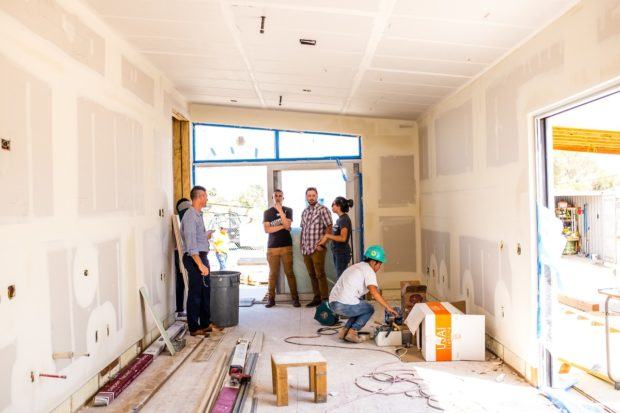
Check out this wide open space!
Many of the materials for the home have been donated by businesses in Las Vegas’ booming hospitality and entertainment industry. This means that the home is constructed of premium, luxurious materials that have also been proven to be durable and easy to maintain.
Support from the Vegas community has been tremendous. Team Vegas lists sponsors on their website, and if you’d like to get involved, you can contact them there. Don’t hesitate, because they’ve only got a couple of weeks to finish and start moving!
Intelligent Systems for Intelligent Living
In order to charge devices and provide power even when the sun isn’t shining, Sinatra has a Tesla battery.
In addition to solar, the home derives some of its power from thermal systems, such as a hot water system that runs beneath the flooring to help maintain a comfortable temperature. The house intelligently decides the most efficient system to use, whether to run on the grid or off, and the goal is for the house to operate without needing the power grid at all.
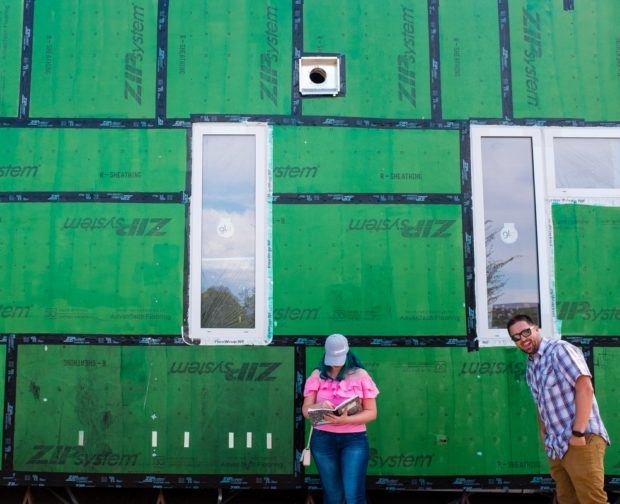
VegasTech checks out the build.
The home is built with redundant systems to prevent power failures, and in the event of emergency, power systems are prioritized to direct energy to any medical or life support devices first.
Through a partnership with Amazon Web Services, the home includes Alexa devices, and these systems allow caregivers to easily monitor residents and home security. Voice commands are built in for safety and convenience, and security and mechanical systems are set once and then run automatically without needing additional input from the resident.
Features such as super efficient windows and a building envelope make the structure fantastic for desert living and more efficient for cooling…and the 3 days each year that your house needs heating in Las Vegas, too.
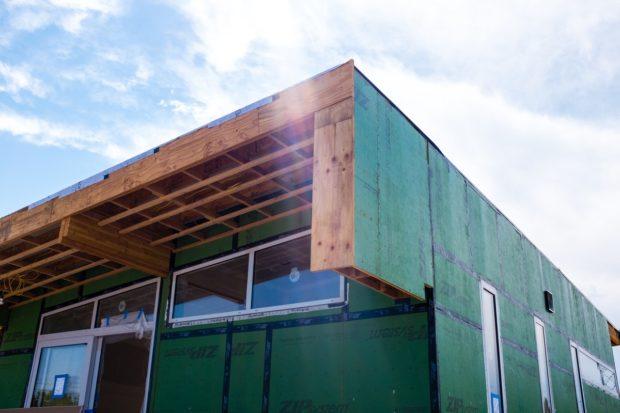
Check out those green features.
After the competition is over, the house will either serve as a model home, or it will find a home at the UNLV campus near the Department of Engineering.
Let’s root for Team Vegas to win 1st Place this year!
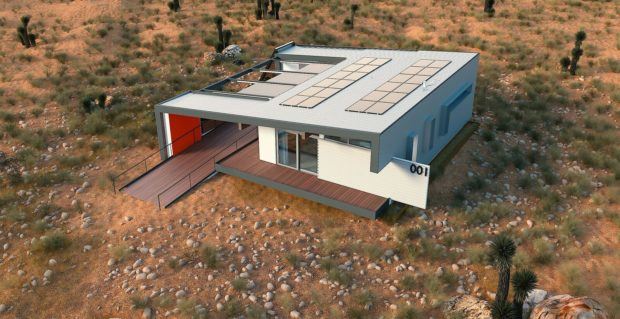

I”ma UNLV alum (’90) who works for eero (top rated in home wi-fi system in the world). We would like to donate a eero system for the UNLV solar home if you need it.
Please have someone form the solar home team contact me via my private email if they would like to do it.
Thanks
Steve
Hey, Steve, that’s very generous of you! VegasTech isn’t directly affiliated with UNLV or the Solar Decathlon team, so they’re much more likely to see this if you send them a message on their website. Here’s a link to their sponsorship page: http://unlvsd.com/sponsorship/
I”ma UNLV alum (’90) who works for eero (top rated in home wi-fi system in the world). We would like to donate a eero system for the UNLV solar home if you need it.
Please have someone form the solar home team contact me via my private email if they would like to do it.
Thanks
Steve
Hey, Steve, that’s very generous of you! VegasTech isn’t directly affiliated with UNLV or the Solar Decathlon team, so they’re much more likely to see this if you send them a message on their website. Here’s a link to their sponsorship page: http://unlvsd.com/sponsorship/
Where is the solar decathlon house now and can I see it?
Right now, the Decathlon House is making its way back to Las Vegas. Once it has a more permanent location and is open to visitors, UNLV will make an announcement. Stay tuned!
Where is the solar decathlon house now and can I see it?
Right now, the Decathlon House is making its way back to Las Vegas. Once it has a more permanent location and is open to visitors, UNLV will make an announcement. Stay tuned!